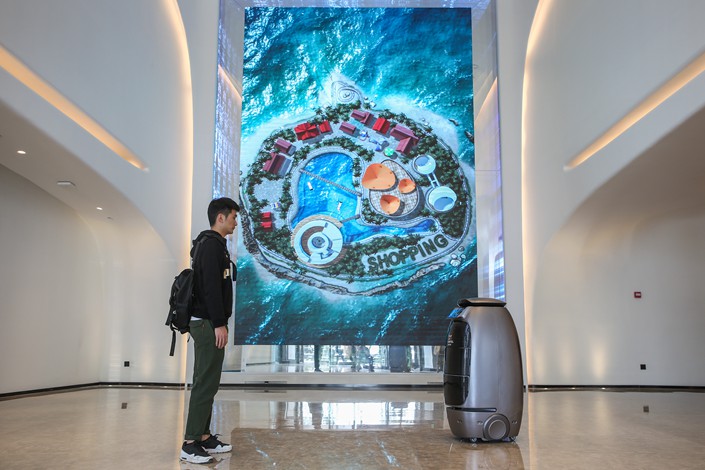Alibaba Switches On First Smart Hotel

Robot receptionists and facial recognition-powered door locks. Chinese e-commerce giant Alibaba Group Holding Ltd. has unveiled its “hotel of the future.”
FlyZoo Hotel has an evocative name in Chinese: Feizhubuke, which sounds close to “Facebook” in the language and can be loosely translated as “staying here is a must.”
The two-block, low-rise hotel will open its doors to guests by the end of the year. It’s located in the company’s headquarters compound in western Hangzhou, the touristic capital of Zhejiang Province. The hotel is near a national wetland park and is less than an hour’s drive from downtown.
Everything in the hotel is high-tech: a check-in counter managed by robots, face scan to operate the elevators and open the room doors. In addition, guests can control the room’s temperature, lighting and appliances with voice commands.
For those who want to experience FlyZoo first-hand: A deluxe room starts from 1,399 yuan ($201) per night, provided that you book it during “Double 11,” a much-anticipated online shopping extravaganza in China that will end later this month. The room’s normal price is 3,000 yuan per night, more than double that of a nearby five-star Sheraton, and 50% more than a night at the Shangri-La, which is located at the city center, Caixin has learned.
FlyZoo will also combine hospitality with Alibaba’s prowess in e-commerce. In the future, customers will be able to shop online for anything they fancy in the room by just taking a photo of the item.
 |
FlyZoo’s guests can control the temperature, lighting and appliances in their rooms with voice commands. Photo: IC |
In addition, a patron can be exempt from paying a deposit if he or she obtains a good rating on Sesame Credit, a private credit-scoring system developed by Alibaba-affiliated Ant Financial Services Group. This deposit-free incentive has been introduced at “hundreds of thousands” of hotels worldwide that partner with Ant Financial’s mobile-payment platform, Alipay.
Over the past two decades, Alibaba has gradually dominated the online shopping space China, and is now seeking to combine its online know-how with offline powers.
Its endeavors into offline businesses including investments in the supermarket chain Sun Art, the department store network Intime and its self-incubated grocery store Hema.
Through the hotel project, the company wished to develop an efficient hospitality management system that can be replicated. Wang Qun, FlyZoo’s chief executive, said the hotel’s management efficiency is 1.5 times that of traditional hotels of similar sizes, though he didn’t how much all the high-tech gadgetry saved the hotel on labor costs.
The news came just days before Alibaba’s disclosure of its latest quarterly financial results on Friday. Its profit dropped over 40% in the April-to-June quarter due to increased compensation for its Ant Financial staff. The company’s shares closed up 6.3% Thursday on the New York Stock Exchange.
Contact reporter Coco Feng (renkefeng@caixin.com)

- 1China Officials Dismiss Tax Hike Rumors After Tech Selloff
- 2Cover Story: How Gutter Oil Became a Prized Fuel for International Airlines
- 3Prominent Chinese Journalist Liu Hu Detained by Police in Chengdu
- 4Maersk Unit Takes Over CK Hutchison Panama Ports After Court Ruling
- 5China Provinces Set Cautious 2026 Growth Targets
- 1Power To The People: Pintec Serves A Booming Consumer Class
- 2Largest hotel group in Europe accepts UnionPay
- 3UnionPay mobile QuickPass debuts in Hong Kong
- 4UnionPay International launches premium catering privilege U Dining Collection
- 5UnionPay International’s U Plan has covered over 1600 stores overseas





